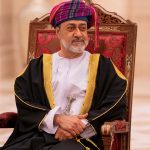Politics
Oman Politics
This page explores Oman’s political structure incorporating real-time RSS feed news and videos. By harnessing the power of RSS feeds, visitors can stay informed about the latest developments in Oman’s politics as they happen. The dynamic nature of these feeds ensures that users receive up-to-the-minute updates on political events, policy changes, and significant milestones, enabling them to stay abreast of the ever-evolving political scene.

Haitham bin Tariq
Sultan of Oman
Prime Minister of Oman
Minister of Defence
Incumbent
Assumed office
11 January 2020
Image credit
Oman operates as an absolute monarchy, with a political structure centered around the Sultan, who serves as the head of state and holds ultimate authority in the country. At the top of the political structure is the Sultan of Oman, who serves as both the head of state and government. The Sultan’s position is hereditary, and the succession is determined within the ruling Al Said family. The Sultan has the power to appoint and dismiss government officials, make important decisions, and set policies for the country.
The executive power in Oman is concentrated in the hands of the Sultan and his appointed Council of Ministers. The Council of Ministers assists the Sultan in governing and implementing policies. The Sultan also holds key positions such as Minister of Defense, Minister of Foreign Affairs, and Minister of Finance.
The legislative branch in Oman is represented by the Council of Oman, which consists of two chambers: the State Council and the Consultative Assembly. The State Council is appointed by the Sultan and acts as a legislative advisory body, while the members of the Consultative Assembly are elected by the people. However, the Council of Oman’s powers are limited, and most legislative decisions are made by the Sultan and the government.
The judiciary in Oman is independent and ensures the interpretation and application of the law. The courts in Oman handle various legal cases and provide access to justice. The Supreme Court is the highest judicial authority in the country.
Political parties are not allowed in Oman, and political participation is limited. Civil society organizations exist, but their activities are monitored closely by the government.
Oman has made efforts in recent years to diversify its economy and implement limited political reforms. The country faces challenges related to political openness, freedom of expression, and human rights. In conclusion, Oman’s political structure is characterized by an absolute monarchy, with the Sultan holding ultimate power and authority. The Sultan and the Council of Ministers exercise executive powers, while the Council of Oman provides advisory and limited legislative functions. The judiciary operates independently, and political participation is limited. Oman’s political system aims to maintain stability and pursue economic development under the leadership of the Sultan.
Unless other sources are listed, original content is provided by ChatGPT. ChatGPT may produce inaccurate information about people, places, or facts. #Oman #OmanPolitics #OmanNews #OmanNewsToday #OmanRSSFeed #BlahFace



